Understanding Motivation: Factors Influencing Work Performance
VerifiedAdded on 2023/06/18
|8
|2011
|424
Report
AI Summary
This report delves into the multifaceted nature of employee motivation, exploring both intrinsic and extrinsic factors that drive individuals to work. It examines Maslow's Hierarchy of Needs as a foundational theory, highlighting how physiological, safety, social, esteem, and self-actualization needs influence work performance. The report further discusses specific motivators such as salary, promotion opportunities, and work environment, while also addressing the positive experiences like growth, authority, and value that employees derive from their roles. Conversely, it acknowledges negative factors like social distance, high expectations, and potential conflicts, proposing strategies to mitigate these challenges through fostering a positive environment, managing pressure, and resolving conflicts effectively. The study concludes that understanding and addressing these diverse motivational elements are crucial for enhancing employee engagement and organizational success. Desklib provides access to similar solved assignments and resources for students.
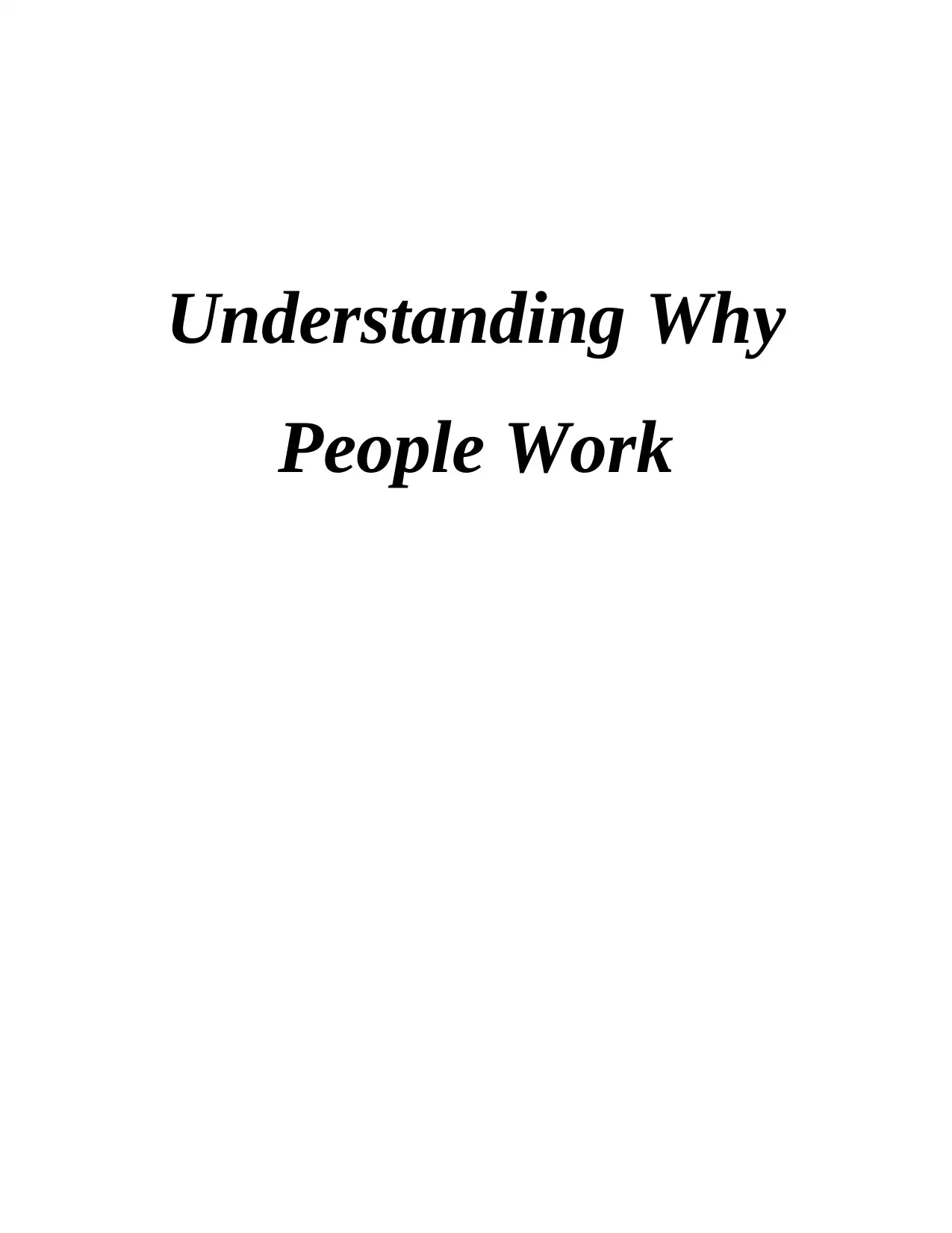
Understanding Why
People Work
People Work
Paraphrase This Document
Need a fresh take? Get an instant paraphrase of this document with our AI Paraphraser
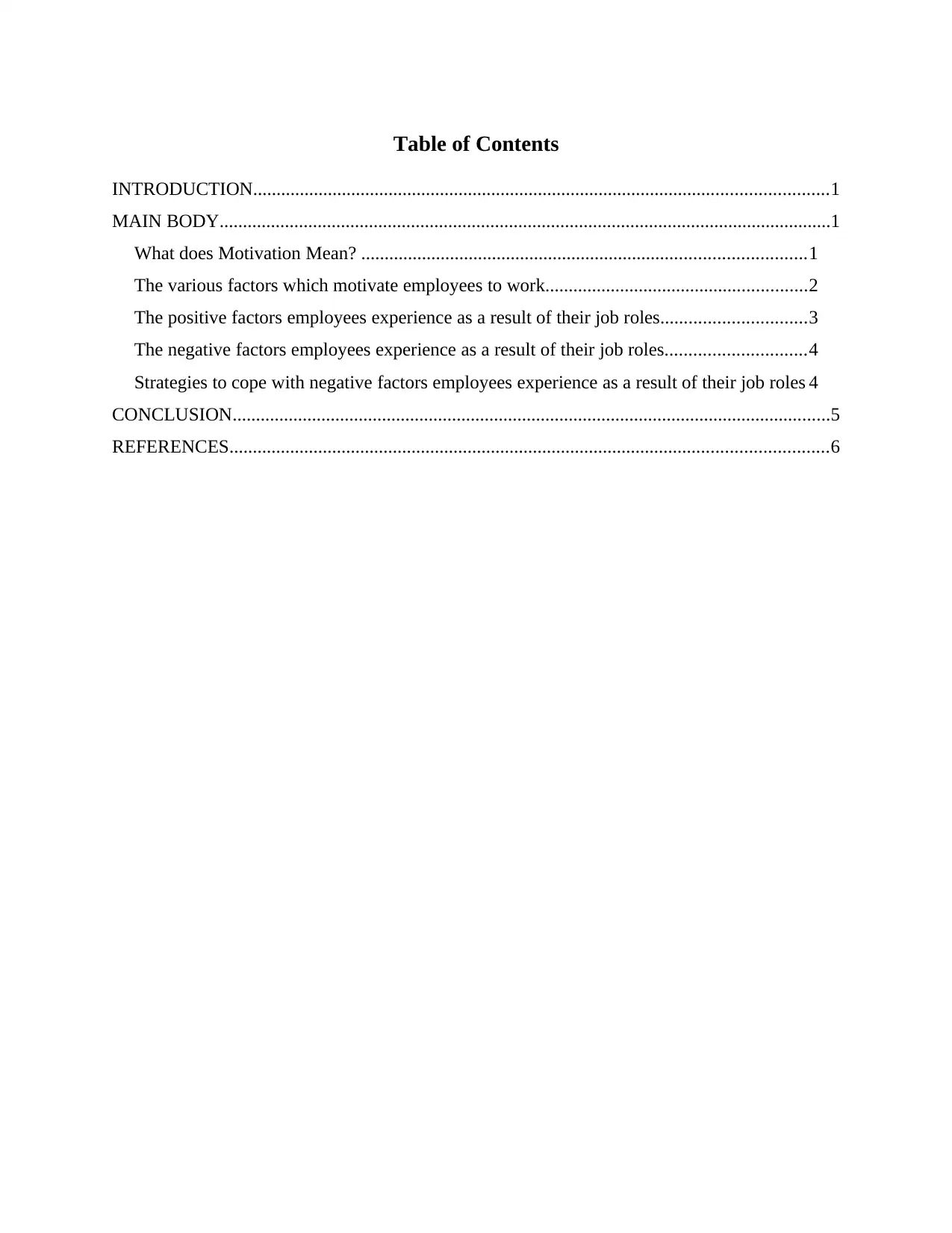
Table of Contents
INTRODUCTION...........................................................................................................................1
MAIN BODY...................................................................................................................................1
What does Motivation Mean? ...............................................................................................1
The various factors which motivate employees to work........................................................2
The positive factors employees experience as a result of their job roles...............................3
The negative factors employees experience as a result of their job roles..............................4
Strategies to cope with negative factors employees experience as a result of their job roles 4
CONCLUSION................................................................................................................................5
REFERENCES................................................................................................................................6
INTRODUCTION...........................................................................................................................1
MAIN BODY...................................................................................................................................1
What does Motivation Mean? ...............................................................................................1
The various factors which motivate employees to work........................................................2
The positive factors employees experience as a result of their job roles...............................3
The negative factors employees experience as a result of their job roles..............................4
Strategies to cope with negative factors employees experience as a result of their job roles 4
CONCLUSION................................................................................................................................5
REFERENCES................................................................................................................................6
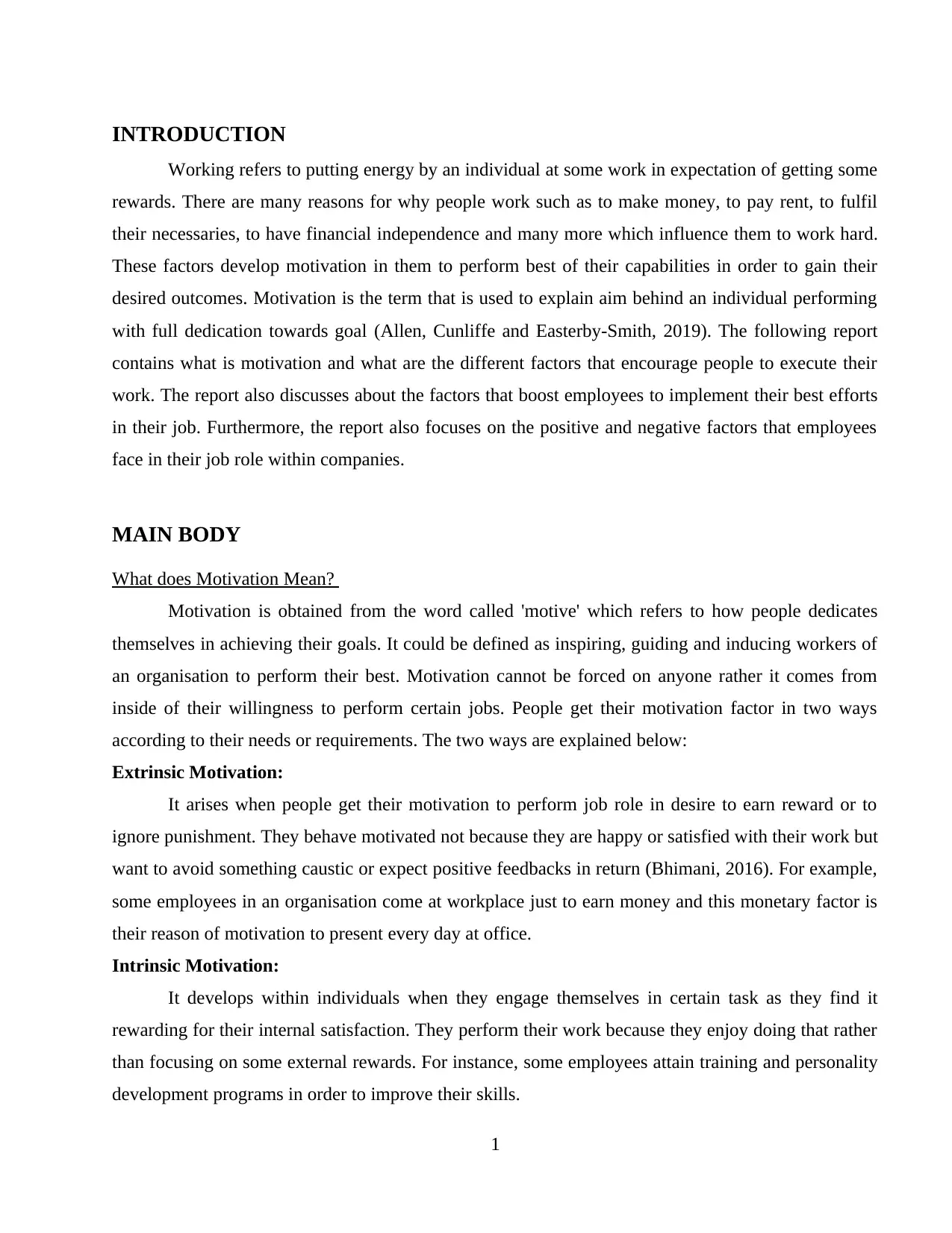
INTRODUCTION
Working refers to putting energy by an individual at some work in expectation of getting some
rewards. There are many reasons for why people work such as to make money, to pay rent, to fulfil
their necessaries, to have financial independence and many more which influence them to work hard.
These factors develop motivation in them to perform best of their capabilities in order to gain their
desired outcomes. Motivation is the term that is used to explain aim behind an individual performing
with full dedication towards goal (Allen, Cunliffe and Easterby-Smith, 2019). The following report
contains what is motivation and what are the different factors that encourage people to execute their
work. The report also discusses about the factors that boost employees to implement their best efforts
in their job. Furthermore, the report also focuses on the positive and negative factors that employees
face in their job role within companies.
MAIN BODY
What does Motivation Mean?
Motivation is obtained from the word called 'motive' which refers to how people dedicates
themselves in achieving their goals. It could be defined as inspiring, guiding and inducing workers of
an organisation to perform their best. Motivation cannot be forced on anyone rather it comes from
inside of their willingness to perform certain jobs. People get their motivation factor in two ways
according to their needs or requirements. The two ways are explained below:
Extrinsic Motivation:
It arises when people get their motivation to perform job role in desire to earn reward or to
ignore punishment. They behave motivated not because they are happy or satisfied with their work but
want to avoid something caustic or expect positive feedbacks in return (Bhimani, 2016). For example,
some employees in an organisation come at workplace just to earn money and this monetary factor is
their reason of motivation to present every day at office.
Intrinsic Motivation:
It develops within individuals when they engage themselves in certain task as they find it
rewarding for their internal satisfaction. They perform their work because they enjoy doing that rather
than focusing on some external rewards. For instance, some employees attain training and personality
development programs in order to improve their skills.
1
Working refers to putting energy by an individual at some work in expectation of getting some
rewards. There are many reasons for why people work such as to make money, to pay rent, to fulfil
their necessaries, to have financial independence and many more which influence them to work hard.
These factors develop motivation in them to perform best of their capabilities in order to gain their
desired outcomes. Motivation is the term that is used to explain aim behind an individual performing
with full dedication towards goal (Allen, Cunliffe and Easterby-Smith, 2019). The following report
contains what is motivation and what are the different factors that encourage people to execute their
work. The report also discusses about the factors that boost employees to implement their best efforts
in their job. Furthermore, the report also focuses on the positive and negative factors that employees
face in their job role within companies.
MAIN BODY
What does Motivation Mean?
Motivation is obtained from the word called 'motive' which refers to how people dedicates
themselves in achieving their goals. It could be defined as inspiring, guiding and inducing workers of
an organisation to perform their best. Motivation cannot be forced on anyone rather it comes from
inside of their willingness to perform certain jobs. People get their motivation factor in two ways
according to their needs or requirements. The two ways are explained below:
Extrinsic Motivation:
It arises when people get their motivation to perform job role in desire to earn reward or to
ignore punishment. They behave motivated not because they are happy or satisfied with their work but
want to avoid something caustic or expect positive feedbacks in return (Bhimani, 2016). For example,
some employees in an organisation come at workplace just to earn money and this monetary factor is
their reason of motivation to present every day at office.
Intrinsic Motivation:
It develops within individuals when they engage themselves in certain task as they find it
rewarding for their internal satisfaction. They perform their work because they enjoy doing that rather
than focusing on some external rewards. For instance, some employees attain training and personality
development programs in order to improve their skills.
1
⊘ This is a preview!⊘
Do you want full access?
Subscribe today to unlock all pages.

Trusted by 1+ million students worldwide
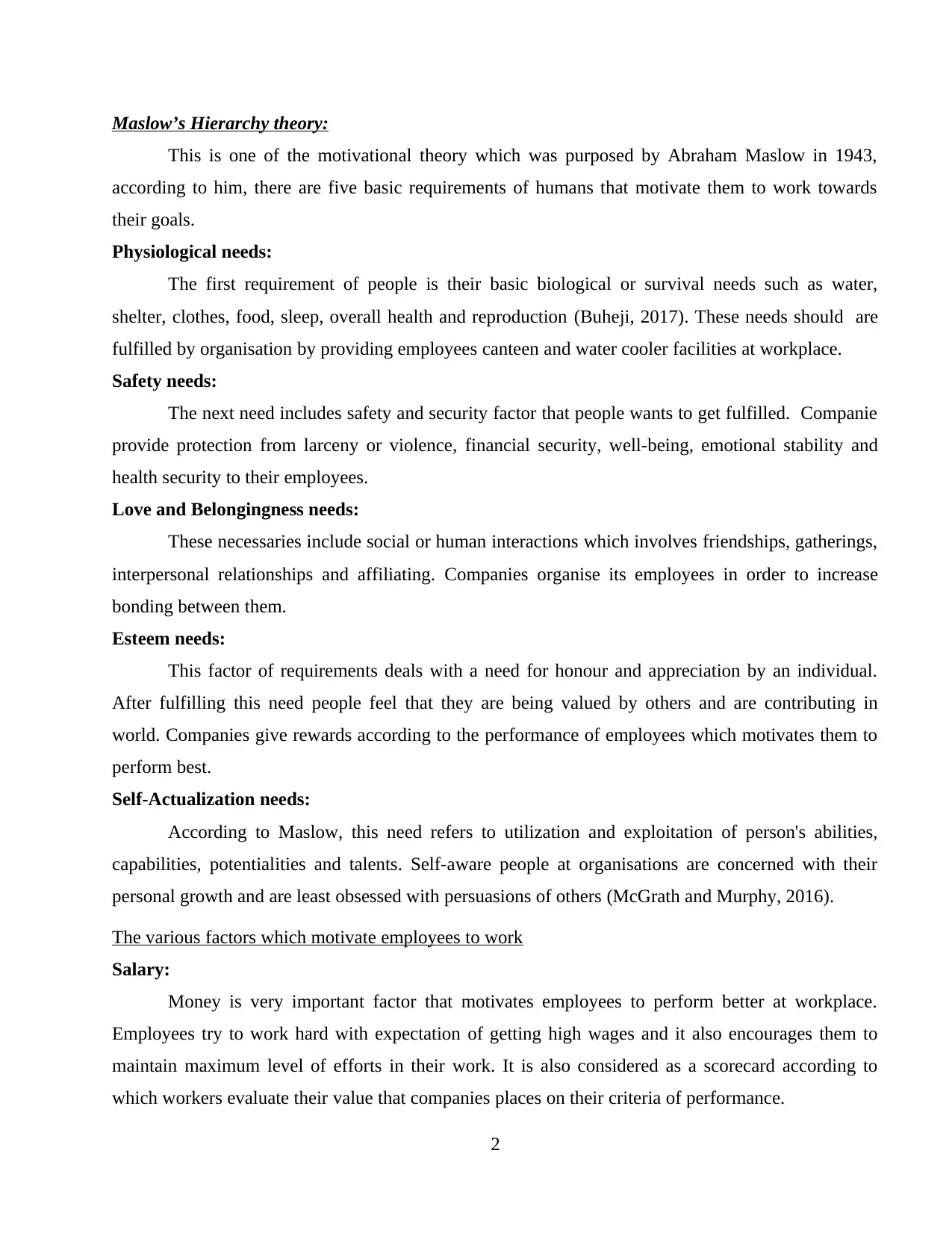
Maslow’s Hierarchy theory:
This is one of the motivational theory which was purposed by Abraham Maslow in 1943,
according to him, there are five basic requirements of humans that motivate them to work towards
their goals.
Physiological needs:
The first requirement of people is their basic biological or survival needs such as water,
shelter, clothes, food, sleep, overall health and reproduction (Buheji, 2017). These needs should are
fulfilled by organisation by providing employees canteen and water cooler facilities at workplace.
Safety needs:
The next need includes safety and security factor that people wants to get fulfilled. Companie
provide protection from larceny or violence, financial security, well-being, emotional stability and
health security to their employees.
Love and Belongingness needs:
These necessaries include social or human interactions which involves friendships, gatherings,
interpersonal relationships and affiliating. Companies organise its employees in order to increase
bonding between them.
Esteem needs:
This factor of requirements deals with a need for honour and appreciation by an individual.
After fulfilling this need people feel that they are being valued by others and are contributing in
world. Companies give rewards according to the performance of employees which motivates them to
perform best.
Self-Actualization needs:
According to Maslow, this need refers to utilization and exploitation of person's abilities,
capabilities, potentialities and talents. Self-aware people at organisations are concerned with their
personal growth and are least obsessed with persuasions of others (McGrath and Murphy, 2016).
The various factors which motivate employees to work
Salary:
Money is very important factor that motivates employees to perform better at workplace.
Employees try to work hard with expectation of getting high wages and it also encourages them to
maintain maximum level of efforts in their work. It is also considered as a scorecard according to
which workers evaluate their value that companies places on their criteria of performance.
2
This is one of the motivational theory which was purposed by Abraham Maslow in 1943,
according to him, there are five basic requirements of humans that motivate them to work towards
their goals.
Physiological needs:
The first requirement of people is their basic biological or survival needs such as water,
shelter, clothes, food, sleep, overall health and reproduction (Buheji, 2017). These needs should are
fulfilled by organisation by providing employees canteen and water cooler facilities at workplace.
Safety needs:
The next need includes safety and security factor that people wants to get fulfilled. Companie
provide protection from larceny or violence, financial security, well-being, emotional stability and
health security to their employees.
Love and Belongingness needs:
These necessaries include social or human interactions which involves friendships, gatherings,
interpersonal relationships and affiliating. Companies organise its employees in order to increase
bonding between them.
Esteem needs:
This factor of requirements deals with a need for honour and appreciation by an individual.
After fulfilling this need people feel that they are being valued by others and are contributing in
world. Companies give rewards according to the performance of employees which motivates them to
perform best.
Self-Actualization needs:
According to Maslow, this need refers to utilization and exploitation of person's abilities,
capabilities, potentialities and talents. Self-aware people at organisations are concerned with their
personal growth and are least obsessed with persuasions of others (McGrath and Murphy, 2016).
The various factors which motivate employees to work
Salary:
Money is very important factor that motivates employees to perform better at workplace.
Employees try to work hard with expectation of getting high wages and it also encourages them to
maintain maximum level of efforts in their work. It is also considered as a scorecard according to
which workers evaluate their value that companies places on their criteria of performance.
2
Paraphrase This Document
Need a fresh take? Get an instant paraphrase of this document with our AI Paraphraser
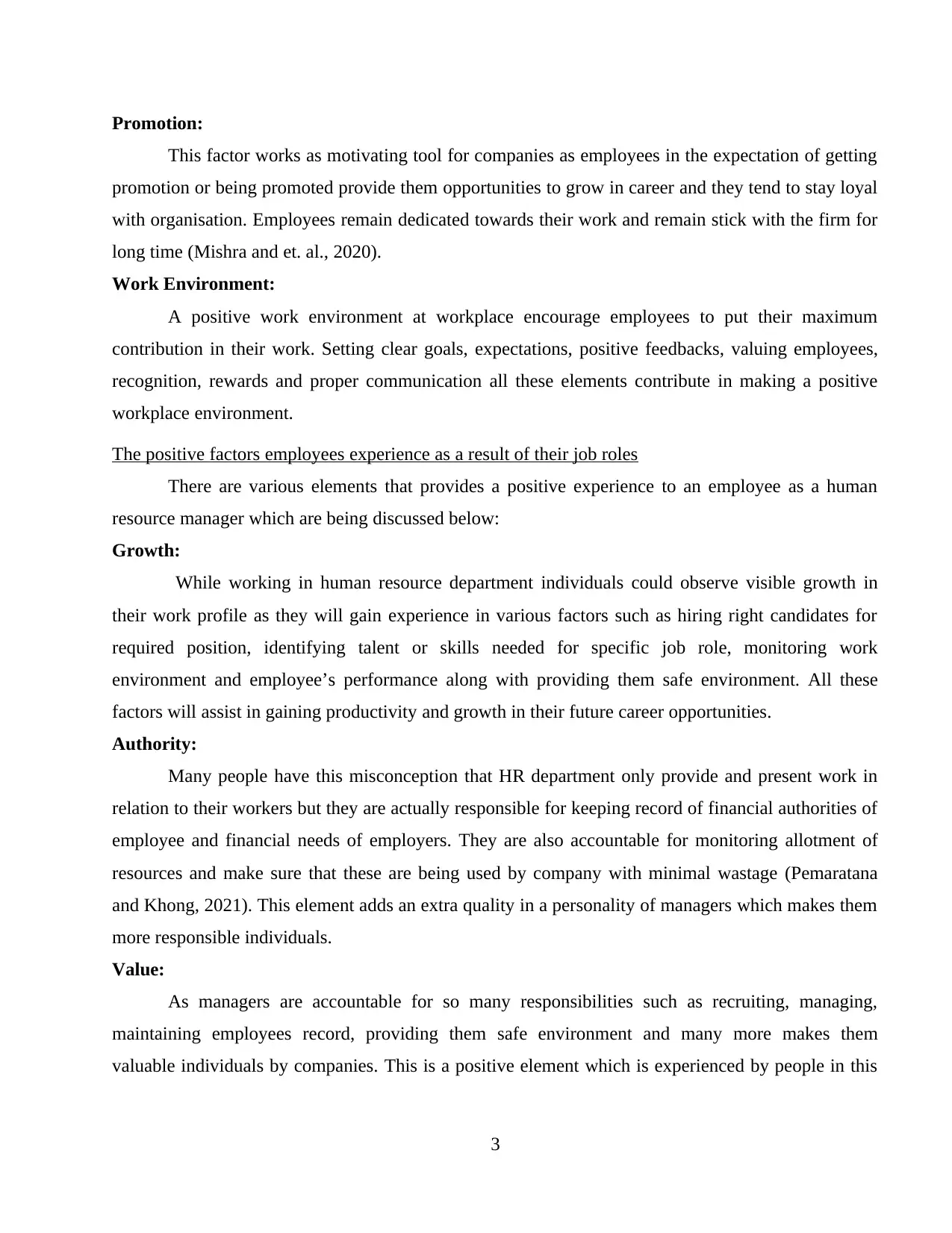
Promotion:
This factor works as motivating tool for companies as employees in the expectation of getting
promotion or being promoted provide them opportunities to grow in career and they tend to stay loyal
with organisation. Employees remain dedicated towards their work and remain stick with the firm for
long time (Mishra and et. al., 2020).
Work Environment:
A positive work environment at workplace encourage employees to put their maximum
contribution in their work. Setting clear goals, expectations, positive feedbacks, valuing employees,
recognition, rewards and proper communication all these elements contribute in making a positive
workplace environment.
The positive factors employees experience as a result of their job roles
There are various elements that provides a positive experience to an employee as a human
resource manager which are being discussed below:
Growth:
While working in human resource department individuals could observe visible growth in
their work profile as they will gain experience in various factors such as hiring right candidates for
required position, identifying talent or skills needed for specific job role, monitoring work
environment and employee’s performance along with providing them safe environment. All these
factors will assist in gaining productivity and growth in their future career opportunities.
Authority:
Many people have this misconception that HR department only provide and present work in
relation to their workers but they are actually responsible for keeping record of financial authorities of
employee and financial needs of employers. They are also accountable for monitoring allotment of
resources and make sure that these are being used by company with minimal wastage (Pemaratana
and Khong, 2021). This element adds an extra quality in a personality of managers which makes them
more responsible individuals.
Value:
As managers are accountable for so many responsibilities such as recruiting, managing,
maintaining employees record, providing them safe environment and many more makes them
valuable individuals by companies. This is a positive element which is experienced by people in this
3
This factor works as motivating tool for companies as employees in the expectation of getting
promotion or being promoted provide them opportunities to grow in career and they tend to stay loyal
with organisation. Employees remain dedicated towards their work and remain stick with the firm for
long time (Mishra and et. al., 2020).
Work Environment:
A positive work environment at workplace encourage employees to put their maximum
contribution in their work. Setting clear goals, expectations, positive feedbacks, valuing employees,
recognition, rewards and proper communication all these elements contribute in making a positive
workplace environment.
The positive factors employees experience as a result of their job roles
There are various elements that provides a positive experience to an employee as a human
resource manager which are being discussed below:
Growth:
While working in human resource department individuals could observe visible growth in
their work profile as they will gain experience in various factors such as hiring right candidates for
required position, identifying talent or skills needed for specific job role, monitoring work
environment and employee’s performance along with providing them safe environment. All these
factors will assist in gaining productivity and growth in their future career opportunities.
Authority:
Many people have this misconception that HR department only provide and present work in
relation to their workers but they are actually responsible for keeping record of financial authorities of
employee and financial needs of employers. They are also accountable for monitoring allotment of
resources and make sure that these are being used by company with minimal wastage (Pemaratana
and Khong, 2021). This element adds an extra quality in a personality of managers which makes them
more responsible individuals.
Value:
As managers are accountable for so many responsibilities such as recruiting, managing,
maintaining employees record, providing them safe environment and many more makes them
valuable individuals by companies. This is a positive element which is experienced by people in this
3
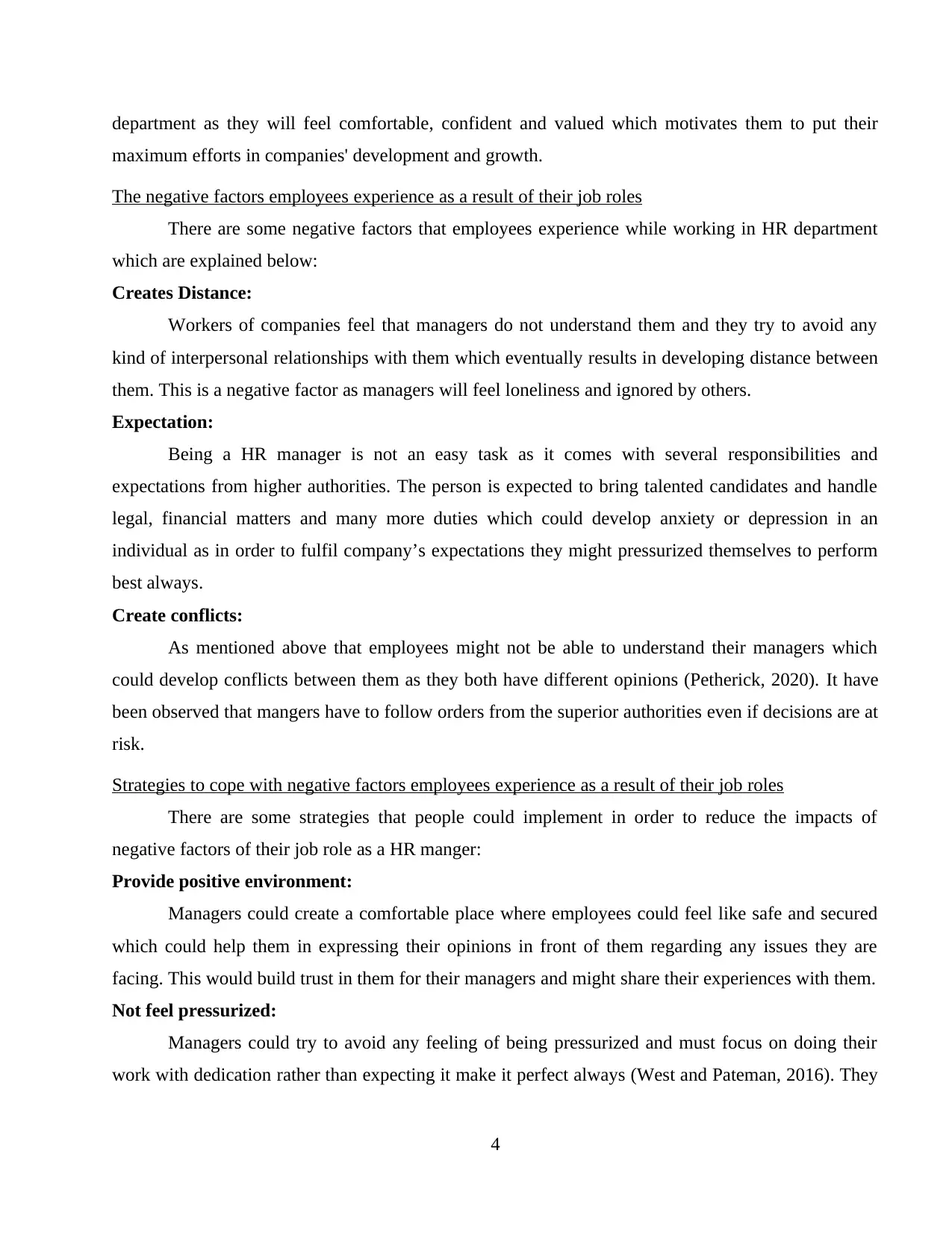
department as they will feel comfortable, confident and valued which motivates them to put their
maximum efforts in companies' development and growth.
The negative factors employees experience as a result of their job roles
There are some negative factors that employees experience while working in HR department
which are explained below:
Creates Distance:
Workers of companies feel that managers do not understand them and they try to avoid any
kind of interpersonal relationships with them which eventually results in developing distance between
them. This is a negative factor as managers will feel loneliness and ignored by others.
Expectation:
Being a HR manager is not an easy task as it comes with several responsibilities and
expectations from higher authorities. The person is expected to bring talented candidates and handle
legal, financial matters and many more duties which could develop anxiety or depression in an
individual as in order to fulfil company’s expectations they might pressurized themselves to perform
best always.
Create conflicts:
As mentioned above that employees might not be able to understand their managers which
could develop conflicts between them as they both have different opinions (Petherick, 2020). It have
been observed that mangers have to follow orders from the superior authorities even if decisions are at
risk.
Strategies to cope with negative factors employees experience as a result of their job roles
There are some strategies that people could implement in order to reduce the impacts of
negative factors of their job role as a HR manger:
Provide positive environment:
Managers could create a comfortable place where employees could feel like safe and secured
which could help them in expressing their opinions in front of them regarding any issues they are
facing. This would build trust in them for their managers and might share their experiences with them.
Not feel pressurized:
Managers could try to avoid any feeling of being pressurized and must focus on doing their
work with dedication rather than expecting it make it perfect always (West and Pateman, 2016). They
4
maximum efforts in companies' development and growth.
The negative factors employees experience as a result of their job roles
There are some negative factors that employees experience while working in HR department
which are explained below:
Creates Distance:
Workers of companies feel that managers do not understand them and they try to avoid any
kind of interpersonal relationships with them which eventually results in developing distance between
them. This is a negative factor as managers will feel loneliness and ignored by others.
Expectation:
Being a HR manager is not an easy task as it comes with several responsibilities and
expectations from higher authorities. The person is expected to bring talented candidates and handle
legal, financial matters and many more duties which could develop anxiety or depression in an
individual as in order to fulfil company’s expectations they might pressurized themselves to perform
best always.
Create conflicts:
As mentioned above that employees might not be able to understand their managers which
could develop conflicts between them as they both have different opinions (Petherick, 2020). It have
been observed that mangers have to follow orders from the superior authorities even if decisions are at
risk.
Strategies to cope with negative factors employees experience as a result of their job roles
There are some strategies that people could implement in order to reduce the impacts of
negative factors of their job role as a HR manger:
Provide positive environment:
Managers could create a comfortable place where employees could feel like safe and secured
which could help them in expressing their opinions in front of them regarding any issues they are
facing. This would build trust in them for their managers and might share their experiences with them.
Not feel pressurized:
Managers could try to avoid any feeling of being pressurized and must focus on doing their
work with dedication rather than expecting it make it perfect always (West and Pateman, 2016). They
4
⊘ This is a preview!⊘
Do you want full access?
Subscribe today to unlock all pages.

Trusted by 1+ million students worldwide
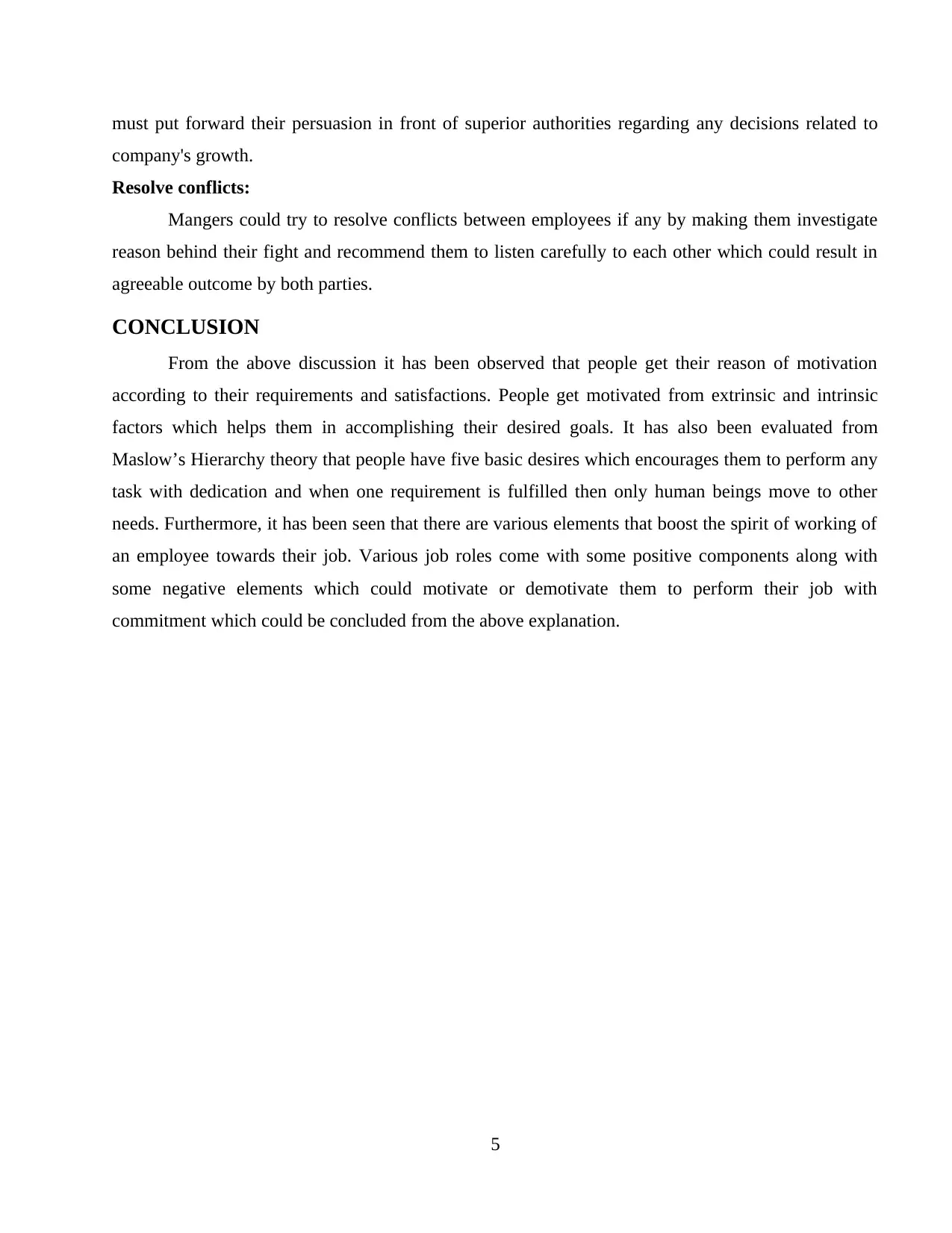
must put forward their persuasion in front of superior authorities regarding any decisions related to
company's growth.
Resolve conflicts:
Mangers could try to resolve conflicts between employees if any by making them investigate
reason behind their fight and recommend them to listen carefully to each other which could result in
agreeable outcome by both parties.
CONCLUSION
From the above discussion it has been observed that people get their reason of motivation
according to their requirements and satisfactions. People get motivated from extrinsic and intrinsic
factors which helps them in accomplishing their desired goals. It has also been evaluated from
Maslow’s Hierarchy theory that people have five basic desires which encourages them to perform any
task with dedication and when one requirement is fulfilled then only human beings move to other
needs. Furthermore, it has been seen that there are various elements that boost the spirit of working of
an employee towards their job. Various job roles come with some positive components along with
some negative elements which could motivate or demotivate them to perform their job with
commitment which could be concluded from the above explanation.
5
company's growth.
Resolve conflicts:
Mangers could try to resolve conflicts between employees if any by making them investigate
reason behind their fight and recommend them to listen carefully to each other which could result in
agreeable outcome by both parties.
CONCLUSION
From the above discussion it has been observed that people get their reason of motivation
according to their requirements and satisfactions. People get motivated from extrinsic and intrinsic
factors which helps them in accomplishing their desired goals. It has also been evaluated from
Maslow’s Hierarchy theory that people have five basic desires which encourages them to perform any
task with dedication and when one requirement is fulfilled then only human beings move to other
needs. Furthermore, it has been seen that there are various elements that boost the spirit of working of
an employee towards their job. Various job roles come with some positive components along with
some negative elements which could motivate or demotivate them to perform their job with
commitment which could be concluded from the above explanation.
5
Paraphrase This Document
Need a fresh take? Get an instant paraphrase of this document with our AI Paraphraser
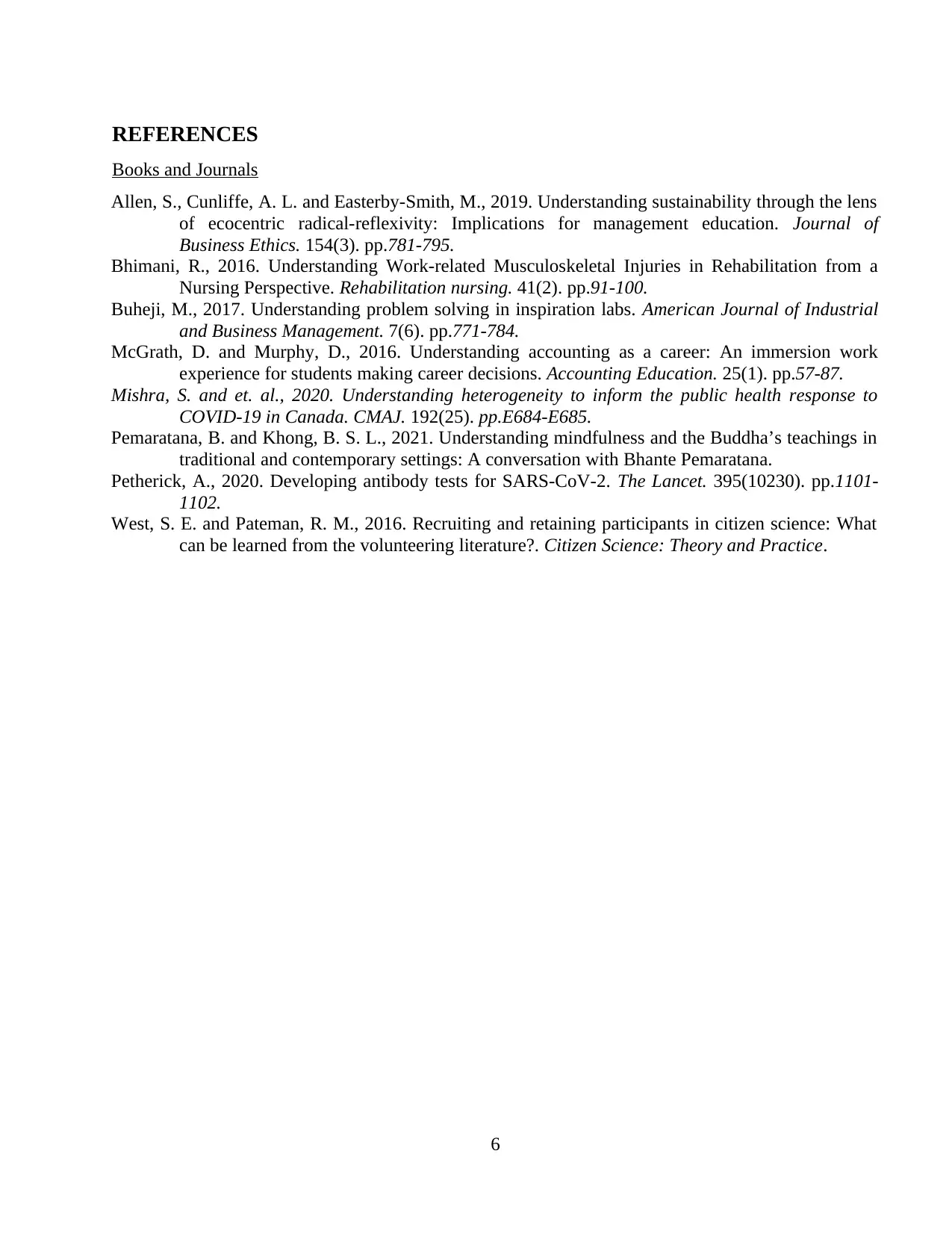
REFERENCES
Books and Journals
Allen, S., Cunliffe, A. L. and Easterby-Smith, M., 2019. Understanding sustainability through the lens
of ecocentric radical-reflexivity: Implications for management education. Journal of
Business Ethics. 154(3). pp.781-795.
Bhimani, R., 2016. Understanding Work‐related Musculoskeletal Injuries in Rehabilitation from a
Nursing Perspective. Rehabilitation nursing. 41(2). pp.91-100.
Buheji, M., 2017. Understanding problem solving in inspiration labs. American Journal of Industrial
and Business Management. 7(6). pp.771-784.
McGrath, D. and Murphy, D., 2016. Understanding accounting as a career: An immersion work
experience for students making career decisions. Accounting Education. 25(1). pp.57-87.
Mishra, S. and et. al., 2020. Understanding heterogeneity to inform the public health response to
COVID-19 in Canada. CMAJ. 192(25). pp.E684-E685.
Pemaratana, B. and Khong, B. S. L., 2021. Understanding mindfulness and the Buddha’s teachings in
traditional and contemporary settings: A conversation with Bhante Pemaratana.
Petherick, A., 2020. Developing antibody tests for SARS-CoV-2. The Lancet. 395(10230). pp.1101-
1102.
West, S. E. and Pateman, R. M., 2016. Recruiting and retaining participants in citizen science: What
can be learned from the volunteering literature?. Citizen Science: Theory and Practice.
6
Books and Journals
Allen, S., Cunliffe, A. L. and Easterby-Smith, M., 2019. Understanding sustainability through the lens
of ecocentric radical-reflexivity: Implications for management education. Journal of
Business Ethics. 154(3). pp.781-795.
Bhimani, R., 2016. Understanding Work‐related Musculoskeletal Injuries in Rehabilitation from a
Nursing Perspective. Rehabilitation nursing. 41(2). pp.91-100.
Buheji, M., 2017. Understanding problem solving in inspiration labs. American Journal of Industrial
and Business Management. 7(6). pp.771-784.
McGrath, D. and Murphy, D., 2016. Understanding accounting as a career: An immersion work
experience for students making career decisions. Accounting Education. 25(1). pp.57-87.
Mishra, S. and et. al., 2020. Understanding heterogeneity to inform the public health response to
COVID-19 in Canada. CMAJ. 192(25). pp.E684-E685.
Pemaratana, B. and Khong, B. S. L., 2021. Understanding mindfulness and the Buddha’s teachings in
traditional and contemporary settings: A conversation with Bhante Pemaratana.
Petherick, A., 2020. Developing antibody tests for SARS-CoV-2. The Lancet. 395(10230). pp.1101-
1102.
West, S. E. and Pateman, R. M., 2016. Recruiting and retaining participants in citizen science: What
can be learned from the volunteering literature?. Citizen Science: Theory and Practice.
6
1 out of 8
Related Documents
Your All-in-One AI-Powered Toolkit for Academic Success.
+13062052269
info@desklib.com
Available 24*7 on WhatsApp / Email
![[object Object]](/_next/static/media/star-bottom.7253800d.svg)
Unlock your academic potential
Copyright © 2020–2026 A2Z Services. All Rights Reserved. Developed and managed by ZUCOL.


